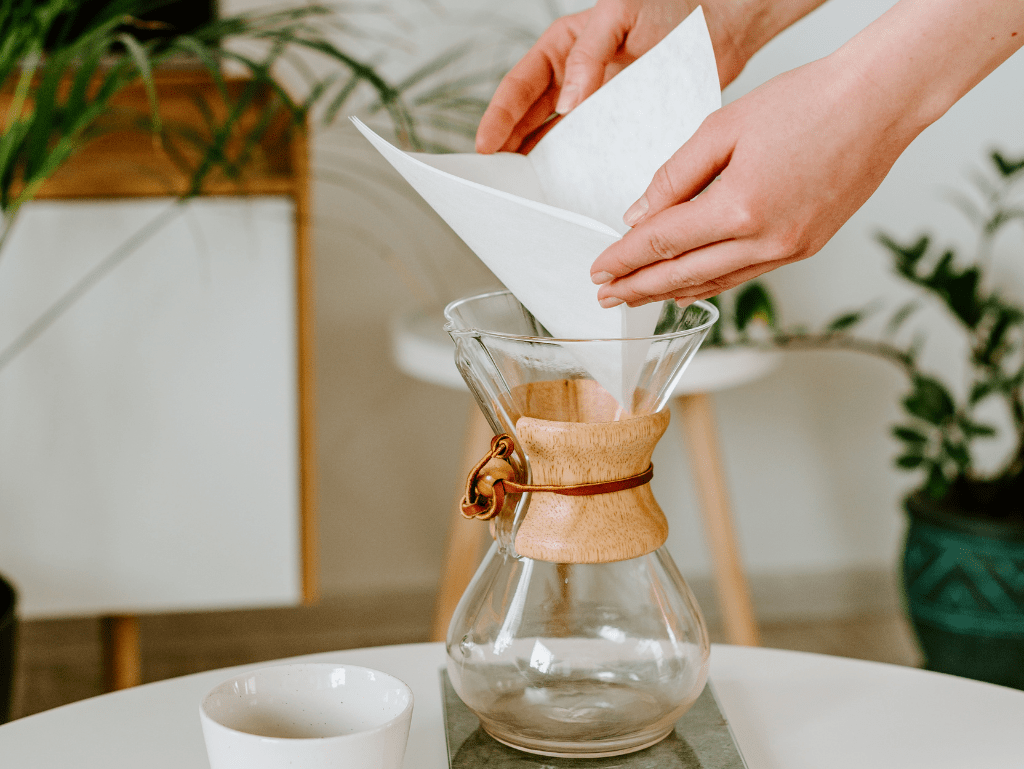Caffeine 911! Here are 6 Emergency
Coffee Filter Substitutes
Your Emergency Coffee Filter Substitutes
At Public Market, we recognize the urgency behind that first sip of morning coffee and that occasionally, an emergency coffee filter might be needed. Whether you’re out camping, traveling, or simply experiencing a filter shortage asking yourself, “What can I use as a coffee filter substitute?” – fear not! This article explores some creative and unconventional coffee filter alternatives that can come to your caffeinated rescue: From the rich history of coffee brewing to the pros and cons of different makeshift filters, we’ll take you through the top coffee filter substitutes in this informational pour-over.
Brewing Coffee: A Rich, Filterless History

Before the days of the coffee machine, as we’ve come to know it, brewing techniques were more hearty than what we’re used to with early coffee hominids using little more than a strainer. Depending on who you speak with, brewing coffee goes back thousands of years, with “advanced” filtering refinements showing up a few hundred years ago.
Let’s start with Turkish Coffee (interchangeable with Greek Coffee and sometimes even called mud coffee). With a cultural affinity for ornamentation, you can expect the presentation to be more important than preparation. With Turkish Coffee, finely ground coffee is brewed on a stovetop as slowly as possible to extract the full flavor. Coffee grinds are placed directly in water and brewed in a “cezve,” which is a small brass pot with a long handle.
The Turkish brewing process boils the coffee to the point of foaming over the top of the cezve before being removed from the flame. In all cases, the brew is transferred into a delicate coffee cup (about the size of an espresso cup) that is hand-painted or sometimes in a glass cup with gold, brass, or silver handle. Available at any coffee shop in Eastern Europe, this blend is served black, with a few sugar cubes on the side, and rarely with milk.
Pro tip: Drink this coffee very slowly and leave the sediment on the bottom. When you are finished, you can turn the cup upside down onto its saucer. After a few minutes, the grinds will have slid down the inside of the cup, and the ancients believe that your fortune could be told in the patterns left by the coffee grinds.
Let’s fast forward a few hundred years and land on the open plains of the wild west. This era saw the development of what we refer to as Cowboy Coffee, a brewing method that uses a tin pot with a rough metal filter over an open fire! This no-nonsense blend will have you saying “ye-haw” in no time.
As the world’s become more civilized, so has our taste for refined coffee. All manner of devices and machines are available, from humble and easy to advanced machinery with its own grinder, water filter, and more.
You can make coffee easily with a scoop of instant coffee; you can grind your own coffee beans at home; find almost any flavor imaginable at the grocery store, and brew to your heart’s content with any type of drip coffee maker that costs anywhere from ten dollars to ten thousand dollars (while still needing to pay for filter paper)!
No matter how serious of a coffee lover you are, one thing remains certain. When you’re looking for your cup of Joe, a day without a filter can present some perilous problems.
Okay. Enough history. Let’s dig into which emergency DIY coffee filter will be best for you.

The Pros and Cons of Paper Towels & Napkins
When faced with a coffee filter emergency, you are left asking, “I ran out of coffee filters – what can I use?” As one of the easiest solutions, Paper towels or napkins can step up to the plate. These everyday household items might not be the traditional choice, but they can get the job done in a pinch.
Pros:
- Accessibility: Paper towels and napkins are readily available in most households and easily found in stores, cupboards, and neighbors’ houses!
- Filtering Capacity: They have decent filtering capabilities, preventing larger coffee grounds from ending up in your cup. You can confidently use paper towels in your drip coffee machine.
- Convenience: Using paper towels or napkins requires no additional equipment or tools.
Cons:
- Absorbency: Paper towels and napkins are highly absorbent, which means you may lose some of the coffee’s flavors and oils. Pro tip: watch for drips from your coffee maker’s filter housing.
- Fragility: Anticipate breakage. They can tear or disintegrate if not handled carefully, leading to potential messes or even coffee grounds in your cup, coffee machine, and more

The Pros and Cons of Using a Tea Ball or Sieve
Get a helping hand from coffee’s cousin: tea! For those who are tea enthusiasts, a tea ball or sieve might be the perfect makeshift filter. These tools are designed to strain tea leaves and similar solubles, which serves as a viable alternative for an emergency coffee filter when the going gets tough.
Pros:
- Reusability: Tea balls and sieves are typically reusable and easy to clean, making them a more eco-friendly option.
- Enhanced Flavor: Due to their finer mesh, they can deliver more flavor and oils from the coffee grounds, resulting in a more robust cup of coffee.
- Versatility: Tea balls and sieves come in various sizes, allowing you to adjust the strength of your coffee by controlling the amount of grounds used.
Cons:
- Limited Capacity: Depending on the size of your tea ball or sieve, you’ll be limited in how much you can brew at once.
- Cleaning Requirements: Coffee grounds can be stubborn to remove from the small mesh, requiring thorough cleaning after each use. It’s always wise to disinfect these types of strainers as rust or bacteria can build up over time.
The Pros and Cons of Using a Thin Cloth Towel (or Even a Sock)
We’ve deliberately placed this option last. But when faced with a serious emergency coffee filter crisis, a thin cloth towel or even a sock can step in as an unconventional but surprisingly effective option. While it may raise a few eyebrows, these alternatives have their own merits and drawbacks.
Pros:
- Reusability: Cloth towels and socks can be washed and reused, making them a sustainable choice. Though, you might want to wash them separately and not with other whites at first!
- Filtering Efficiency: They can trap coffee grounds while allowing the liquid to pass through, resulting in a surprisingly smooth cup of coffee.
- Flexibility: These materials can be shaped and adjusted to fit different brewing setups, providing a versatile solution without needing a rubber band as elastic waists and seams work wonders.
Cons:
- Potential Flavor Absorption: Depending on the material and its previous use, cloth towels or socks may impart their own
- Potential Yuck: If you’re going to use a cloth napkin or towel, chances are, there won’t be any, ummm, added flavors. If things are really desperate, consider reverting to a brew of Cowboy Coffee or even using an emptied tea bag before a gym sock that may or may not have been washed.
Which Alternative Might Be Best?
When it comes to emergency coffee filter substitutes, the idea of “best” is a totally subjective answer. While all the alternatives discussed have their pros and cons, let’s have a quick review from our team of Public Market coffee connoisseurs.
- Our Favorite: A Tea Ball or Sieve. For those who appreciate the nuances of flavor and don’t mind a bit of improvisation, a tea ball or sieve can provide a more refined brewing experience. The finer mesh of these tools allows for better retention of flavors and oils, resulting in a richer and more aromatic cup of coffee.
- The Runner Up: Paper Towels or Napkins. If convenience and accessibility are your primary concerns, reaching for a paper towel or napkin might be the easiest solution. While they may not offer the same finesse as a dedicated coffee filter, they can adequately strain the coffee grounds, ensuring a satisfying cup. indigestion).
- Last But Not Least: A Thin Cloth Towel or Sock. If you find yourself in a truly desperate coffee situation, Morgan stands by the fact that a thin cloth towel or even a clean sock can surprisingly come to the rescue. With their versatility and reusability, he loves knowing that a coffee filter is waiting for him in his closet when necessary. Ultimately, the “best” alternative depends on your preference and available materials. Desperate times call for desperate actions, so use what you can as a coffee filter and get on with your day!
If convenience and availability are paramount, paper towels or napkins may be your go-to choice. However, a tea ball or sieve could elevate your coffee experience if you value flavor and a touch of creativity. And for the truly, um, resourceful coffee enthusiast, a thin cloth towel or sock can offer a surprisingly effective solution.
Remember, these alternatives are intended for emergencies and should not replace regular coffee filters for everyday use. So, the next time you’re lost in the wilderness (or the kitchen) without a coffee filter, don’t panic! Embrace the adventure and explore the unconventional options to brew your beloved cup of coffee.
Ultimately, the most important thing is to relish every sip and appreciate the available options when faced with a coffee filter emergency. So if you ran out of coffee filters and are asking yourself, “What coffee filter substitutes can I use?” — Keep calm and coffee on!
How will you do the emergency brew? Tell us and appear on this blog!
Subscribe to Public Market to have a chance to be published here and to get all our premium content delivered to your inbox – it’s free!


